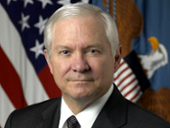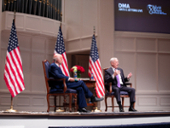Power-Sharing in Afghanistan

It's no secret that Afghanistan is plagued by a poisonous combination of ethnic violence and political controversy. This is nothing new, the Afghan government has been affected by instability for centuries. In the modern era, dating from British involvement in the region to the 2014 elections, the West played a key role in helping to determine Afghanistan's political leaders in the hope of creating some measure of stability.
Ashraf Ghani is a member of Afghanistan's largest ethnic group, the Pashtuns. In 2014, he won the presidential election against rival Abdullah Adbullah, who was supported by the second-largest ethnic group, the Tajiks. Afterward, Abdullah argued the election was rigged, which sparked fears of ethnic violence and broader conflict. Then-Secretary of State John Kerry brokered a power-sharing deal between the two leaders. President Ghani was required to share power with Abdullah, who became chief executive. Together, the two of them made decisions regarding the military and other important executive functions. For the last five years, this held the government together, albeit with the usual accusations of ethnic bias.
The 2019 election once again ended with Ghani and Abdullah garnering the most votes. Ghani won a second term, and Abdullah was the runner-up. This time, however, neither side would let up, both insisting they were the legitimate victor. The United States attempted to intervene, cutting $1 billion in aid, but no end to the crisis was in sight. In the meantime, the Taliban benefited from the chaos, ultimately bringing both politicians to the table.
On Sunday, the two parties struck their final power-sharing deal. Dr. Abdullah is no longer chief-executive, but instead is chairman of the High Council for National Reconciliation (and his Twitter bio no longer claims he is the President of Afghanistan). His new role in the government is centered around seeking peace with the Taliban. In addition, Abdullah's coalition is able to appoint half of the executive cabinet members. The deal was built to emphasize the personal strengths of each leader.
The New York Times reports that "Mr. Ghani is deeply technical and enjoys the weeds of governance and system-building." With the new system, he is able to play a larger role in executive administration and share less of these responsibilities with Abdullah. On the other hand, Abdullah's career has been focused on peacemaking. He is now able to put his peacemaking skills to use in what is perhaps modern Afghanistan's most important goal rallying government elites and securing peace with the Taliban. It remains to be seen if the mostly Pashtun Taliban will trust Dr. Abdullah.
Political forecasters believe this deal will have a positive effect on the peace process. Shuja Nawaz, a fellow at the South Asia Center, summarizes the opinion of many when he states, "The agreement between Dr. Abdullah Abdullah and President Ashraf Ghani represents the basic and enduring truth of Afghanistan: Afghans have the best solutions for their problems.
Perhaps the West should finally take a step back. Although the United States and the Taliban signed a deal in February, insurgency across Afghanistan has increased in the last few months. Taliban leaders took advantage of the political chaos as an opportunity to increase attacks. They refuse to agree to a ceasefire until they negotiate directly with the Afghan government, which is now due to happen under Dr. Abdullah's authority.
The United States is set to take a less prominent role than it has historically, while the Afghan government itself wrestles with the question of how to resolve internal conflict. According to James B. Cunningham, who formerly served as ambassador to Afghanistan, President Trump will likely condition the withdrawal of US troops on the success of Afghan-Taliban negotiations. In short, Dr. Abdullah will need to rely on his talents as a coalition builder and peacemaker if he is to even get the necessary parties to the table.
Few Americans pay much attention anymore to the region that has witnessed the US military's longest-running conflict. Is there a framework from which we can build an informed worldview on the subject? We would suggest a Kuyperian model that emphasizes a comprehensive Christian worldview, one in which we recognize God's sovereignty over all things. What then might this prompt us to do?
First, we should pray for the success of Dr. Abdullah's peace negotiations. The people of Afghanistan have had to live in a constant state of conflict for decades, and any steps toward peace-building are a source of hope. First Corinthians reminds us that "God is not a God of confusion but of peace." The Christian should rejoice when peace reigns and should pray for peace to come to those who do not have it. Since Christ's redemptive work extends to all of the world, we should be mindful of the implications of U.S. foreign policy on Afghan civilians.
This is not to suggest that we advocate a pacifist foreign policy, but rather that our eagerness for U.S. hegemony should not cloud our primary mission of seeing God's redemptive work be accomplished and working for the "shalom" of the city.
References:
Afghan power sharing deal breaks Kabul's political impasse and raises hope for unity. (2020, May 18). Atlantic Council. https://www.atlanticcouncil.org/blogs/new-atlanticist/afghan-power-sharing-deal-breaks-kabuls-political-impasse-and-raises-hope-for-unity/
Afghan Rivals Sign Power-Sharing Deal as Political Crisis Subsidies ;The New York Times. (n.d.). Retrieved May 27, 2020, from https://www.nytimes.com/2020/05/17/world/asia/afghanistan-ghani-abdullah.html
Naugle, David. (2004). Who was Abraham Kuyper? DBU Honors Program. https://www.dbu.edu/naugle/academic-papers/_pdfs/06/factsheet_abraham.pdf
Seek the Shalom of the City | Institute For Faith, Work & Economics. (n.d.). Retrieved May 27, 2020, from https://tifwe.org/seek-the-shalom-of-the-city/
Shahrani, N. (n.d.). The Afghan president has more powers than a king. Retrieved May 27, 2020, from https://www.aljazeera.com/indepth/opinion/afghan-president-powers-king-180103050939230.html
What is Kuyperian Calvinism? (2012, March 9). Evangel Classical School. http://evangelcs.org/kuyper/
Lee Bratcher is the Executive Director of the Institute for Global Engagement at Dallas Baptist University.
Josh Farquhar is a contributor for Dallas Baptist University's Institute of Global Engagement (IGE).





